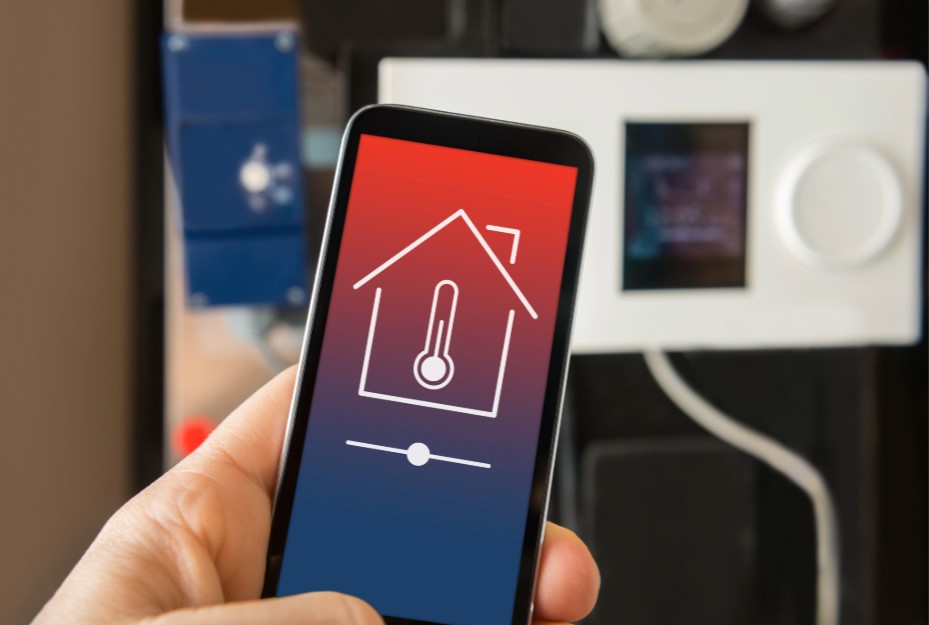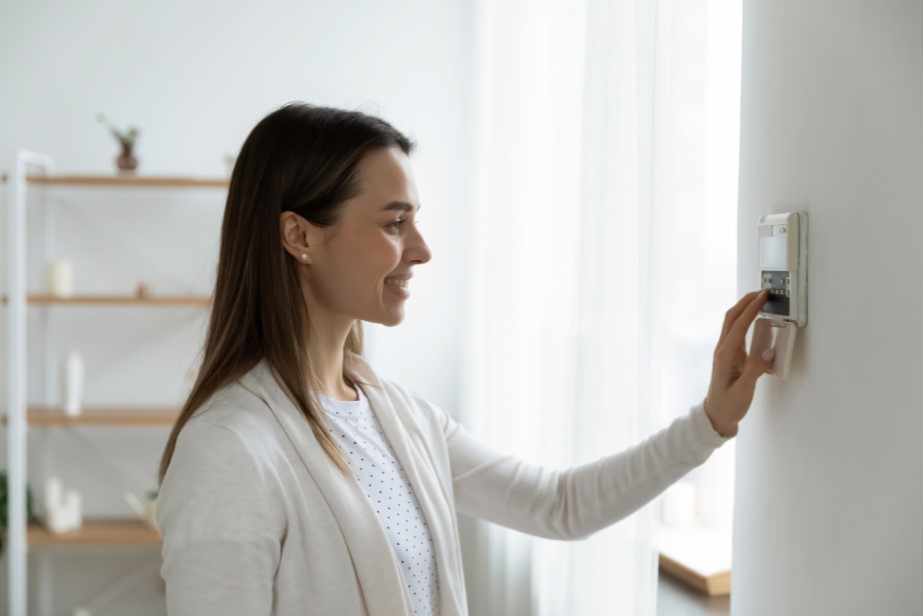What are HVAC zoning systems, and how do they enhance home heating efficiency?

In the world of HVAC – heating, ventilation, and air conditioning – technology is constantly evolving to offer better solutions for energy efficiency and comfort. One such innovation is the HVAC zoning system, a cutting-edge approach to home heating in New Jersey that’s set a higher standard throughout the industry.
HVAC zoning systems are advanced temperature control setups that divide a property into zones with independent thermostats. Zoning systems allow customized heating for each zone, reducing energy waste by solely heating occupied spaces. This targeted approach not only cuts utility bills but also ensures comfort while benefiting the environment.
An HVAC zoning system is a departure from traditional HVAC systems. It offers a more refined approach to controlling the temperature in your home. With this system, you can independently adjust the heat in different zones or rooms, providing a level of customization that’s simply unmatched by conventional methods.
This enhances indoor air quality and also significantly reduces energy consumption. By only heating the areas of your home that need it, you eliminate unnecessary energy usage, leading to a more energy efficient system. This results in lower utility bills and a smaller carbon footprint, making HVAC zoning systems a win-win for both your wallet and the environment.
Zoning Systems Customize Your Home Heating
Here at Beachwood Air, we’re committed to providing the best Toms River area HVAC system services to our residential and commercial customers in Ocean and Monmouth County. Our team prioritizes customer satisfaction above all else, offering prompt, reliable, and affordable solutions for HVAC system installation, maintenance, and heating and cooling repairs.
The benefits of HVAC zoning systems are in how can help tailor your home heating for optimal comfort and energy efficiency.
Personalized Temperature Control and Enhanced Energy Efficiency
Zoning systems provide precise control of the temperature in different areas or “zones” of your home or commercial space, making them an excellent energy efficient option.
Unlike traditional HVAC systems that uniformly heat or cool the entire property, zoning systems divide your home into multiple zones with individual thermostats, enabling precise regulation of airflow and conditioned air delivery.
These systems cater to different areas based on occupancy and preferences, ensuring each zone reaches the desired temperature without wasting energy on unoccupied spaces. By heating or cooling only where needed.

Zoning systems promote improved indoor air quality by customizing the distribution of conditioned air, preventing stagnant or excessive airflow in certain areas. This targeted approach maximizes comfort while minimizing energy waste.
How do Zoning Systems Work?
HVAC zoning systems divide your property into distinct zones, each with its own thermostat. This allows for independent control of them temperature in each area, which can be as broad as entire floors or as specific as individual rooms.
The HVAC system operates through a network of dampers installed in the ductwork. These dampers function like valves, opening and closing based on the temperature settings of each zone’s thermostat. When a zone requires heating or cooling, the damper for that area opens, allowing conditioned air from your HVAC system to flow in.
All these components are managed by a control panel, which coordinates the opening and closing of dampers based on the input it receives from each zone’s thermostat.
Components of a Zoning System
An HVAC zoning system comprises several key components:
- Thermostats: Each zone has its own thermostat, allowing for independent temperature control. You can set different temperatures for different zones depending on their usage and occupancy.
- Dampers: Installed within the ductwork, dampers control the flow of heated or cooled air to each zone. They open or close based on the commands from the central control panel.
- Central Control Panel: This is the brain of the zoning system. It processes the information from each thermostat and controls the dampers accordingly.

Types of Zoning Systems
There are several types of HVAC systems that use zoning, each designed to suit different needs and property types. For instance, some systems use wired thermostats, while others use wireless ones for more installation flexibility. Other systems might utilize smart technology, allowing you to control your zones remotely using a smartphone or tablet.
Regardless of the type, a professional HVAC technician from Beachwood Air can help you choose the right zoning system for your property, taking into account factors such as size, layout, and usage patterns.
Investing in an HVAC zoning system can significantly reduce your heating and cooling costs. By only conditioning the zones that need it, you avoid wasting energy on unoccupied or rarely used areas, leading to lower utility bills. Plus, with Beachwood Air’s expertise in HVAC system installation, repairs, and maintenance, you can rest assured that your zoning system will operate at peak efficiency for years to come.
The Benefits of Zoning Systems
Zoning systems change how homeowners and businesses manage their heating and cooling needs. With the ability to provide independent temperature control across different areas of a property, zoning systems provide significant benefits: energy efficiency, cost savings, and enhanced comfort.
Energy Efficiency
One of the most compelling advantages of zoning in HVAC systems is their capacity for remarkable energy efficiency. A traditional HVAC system works on an all-or-nothing principle, heating or cooling the entire property regardless of how each room is being used. This approach often results in significant energy waste.
These zoning systems operate based on the specific needs of each zone in your property. By allowing you to heat or cool only the areas that are occupied, these systems ensure that no energy is wasted on unoccupied or infrequently used spaces.
This targeted approach to heating and cooling reduces your property’s overall energy consumption. In turn, this contributes to a smaller carbon footprint, making zoning systems not just a smart choice for your wallet, but also a responsible one for the environment.
Cost Savings
The energy efficiency of a zoning system translates directly into cost savings, particularly when it comes to your heating bills. By only conditioning the zones of your property that need it, you avoid wasting energy and money on heating unoccupied spaces.
But the savings don’t stop there. Since zoning systems reduce the load on your HVAC equipment, they can extend its lifespan, saving you money on potential repair or replacement costs. And with the expertise of Beachwood Air professional HVAC services, your zoning system will be installed and maintained to operate at peak efficiency, maximizing your savings.
Comfort
Beyond the energy and cost benefits, they also significantly improve the comfort levels in your home or commercial space. They allow you to customize the temperature in each zone based on personal preferences and the specific needs of that area.
Perhaps you prefer your bedroom cooler at night, or maybe your kitchen gets too warm when you’re cooking. With a zoning system, you can adjust the temperature settings for each room, ensuring optimal comfort wherever you are in your property.
Installing a Zoning System in Your Home
Whether you’re seeking enhanced comfort or energy efficiency, installing an HVAC zoning system is a smart move. The process involves a series of steps that, while not overly complex, require a certain degree of technical knowledge and experience. Here’s a basic overview of what the installation entails:
Basic Steps Involved in Installing a Zoning System
- Assessment: The first step is to evaluate your property’s layout and heating and cooling needs. This assessment will determine how many zones you need and where they should be located.
- Design: Once the zones are defined, a design plan is created for the placement of dampers in the ductwork and thermostats in each zone.
- Installation of Dampers: The dampers, which control the air flow to each zone, are installed in the ductwork.
- Thermostat Installation: Each zone will have its own thermostat installed, allowing for independent temperature control.
- Central Control Panel Installation: The central control panel, which coordinates the entire system, is installed and connected to all the thermostats and dampers.
- System Testing: After everything is installed, the system is tested to ensure it’s working correctly and efficiently.
When to Hire a Professional HVAC Company in the Toms River area
While it’s possible for an experienced DIY enthusiast to install a zoning system, there are several reasons why it might be beneficial to hire a professional HVAC technician:
- Expertise: A professional has the training and experience to handle every aspect of the installation, ensuring it’s done correctly and safely.
- Time and Convenience: Installing a zoning system can be time-consuming, especially if you’re not familiar with the process. A professional can complete the job more quickly and efficiently.
- Guaranteed Performance: A professional installation guarantees that your zoning system will perform at peak efficiency, providing the comfort and energy savings you expect.
Addressing Common Challenges in HVAC Zoning Systems
Understanding HVAC zoning is pivotal for maintaining an efficiently functioning system throughout your entire building. Despite the myriad benefits, some common challenges might arise that could affect the control of temperature across separate zones.
Thermostat Discrepancies:
Inconsistent thermostat settings or inaccurate readings can result in hot and cold spots. Ensure all thermostats are calibrated correctly and set to desired temperatures for each zone. Consider smart thermostats for precise zone control and remote adjustments, preventing temperature disparities.
Damper Malfunctions:
Damper issues, like improper opening or closing, can disrupt the directed flow of conditioned air. Regularly check dampers for proper functioning. If specific zones feel inadequately cooled or heated, it might indicate damper problems requiring professional attention.
Central Control Panel Issues:
A malfunctioning control panel can disrupt communication between thermostats and dampers, affecting zone control. Troubleshoot basic settings or power issues; however, for intricate problems, seek assistance from HVAC professionals to prevent system-wide failures.
Addressing Cooling Load:
Zoning systems aim to reduce energy consumption by directing conditioned air only where needed. However, if your system seems strained or inefficient in cooling, it might be dealing with a heavy cooling load. Ensure proper maintenance, such as regular filter replacements, and consider professional inspection to optimize your system’s performance and save energy.
Dealing with Hot and Cold Spots:
If certain zones experience inconsistent temperatures, it could signal system imbalances. Check for obstructions in airflow paths or recalibrate thermostats to eliminate temperature variations. If issues persist, consult HVAC experts to diagnose and resolve underlying problems effectively.
Regular maintenance, setting appropriate thermostat configurations, and utilizing smart technologies for zone control can prevent these challenges. While troubleshooting minor issues is possible, seeking professional assistance for intricate problems ensures fewer repairs and optimal functioning of your HVAC zoning system, ultimately saving energy and enhancing comfort across your property.
Get A Zoning HVAC System in Ocean County, NJ
The benefits of implementing an HVAC zoning system in your property are hard to ignore. This technology offers significant cost savings, environmental benefits, and improved comfort that traditional systems struggle to match. It’s an investment that not only pays for itself over time but also enhances the overall quality of your living or working environment.
The HVAC system installation process does require a degree of expertise. Hiring a professional service like Beachwood Air ensures efficiency, safety, and optimal performance from your investment. Embrace the future of heating and cooling with HVAC zoning systems and enjoy the multitude of benefits they bring.

